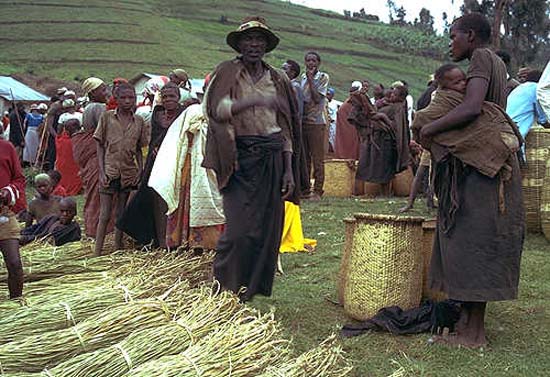
Fifty years after the Holocaust, but only two years after the publishing of Browning's book, a tiny country in central Africa showed again the depths to which we humans can sink and made a mockery of the world's pledge of "never again." The 1994 Rwandan genocide has often been compared to Hitler's Final Solution, and understandably so. Even though the death toll of 800,000 Tutsi and moderate Hutu Rwandans equaled only a fraction of the 6 million Jews killed by the Nazis, the intent -- to purge society of a substantial and delineated chunk of its members -- was the same. And what the Rwandan killers lacked in quantity of victims, they made up for in awful speed and efficiency. Those 800,000 people were struck down in 100 days.
Ivory Coast RPCV Austin Merrill reviews the Rwandan story in the words of the killers
The Rwandan story in the words of the killers
- Reviewed by Austin Merrill
Sunday, June 26, 2005
Click to View
Machete Season
The Killers in Rwanda Speak
By Jean Hatzfeld; translated by Linda Coverdale
FARRAR, STRAUS & GIROUX; 260 PAGES; $24
Of all the books written about the Holocaust, one of the most disturbing is historian Christopher Browning's "Ordinary Men: Reserve Police Battalion 101 and the Final Solution in Poland." Published in 1992, the book tells of a group of middle-aged Germans who were recruited as reserve police officers during World War II and sent to Poland, where they were transformed from seemingly unremarkable men into cold-blooded -- and prolific -- killers.
From mid-1942 to late 1943, the 500 members of Reserve Police Battalion 101 systematically murdered nearly 40,000 men, women and children. The vast majority of the victims were Jewish; none could defend themselves. The killers were not, for the most part, members of the Nazi party, nor did they describe themselves as particularly anti-Semitic. And yet these average, working-class men became the sort of brutes who specialized in shooting Jewish children in the back of the head or spraying gunfire into a hospital ward full of emaciated patients.
Browning's chief intent in writing the book was to understand and explain the behavior of these previously rational people who had somehow given themselves over to horrific malice. What he found was that society had been turned on its head. "Mass murder and routine had become one. Normality itself had become exceedingly abnormal," Browning wrote. And he ended his book with a haunting thought: "If the men of Reserve Police Battalion 101 could become killers under such circumstances, what group of men cannot?"
Fifty years after the Holocaust, but only two years after the publishing of Browning's book, a tiny country in central Africa showed again the depths to which we humans can sink and made a mockery of the world's pledge of "never again." The 1994 Rwandan genocide has often been compared to Hitler's Final Solution, and understandably so. Even though the death toll of 800,000 Tutsi and moderate Hutu Rwandans equaled only a fraction of the 6 million Jews killed by the Nazis, the intent -- to purge society of a substantial and delineated chunk of its members -- was the same. And what the Rwandan killers lacked in quantity of victims, they made up for in awful speed and efficiency. Those 800,000 people were struck down in 100 days.
French journalist Jean Hatzfeld covered the genocide and wrote a book in 2000 on Tutsi survivors from the commune of Nyamata, near Rwanda's southern border with Burundi. Now he has written another book, also based in Nyamata, but this time focusing on the stories of the Hutu killers. In "Machete Season: The Killers in Rwanda Speak," Hatzfeld modifies Browning's approach -- instead of relying on document research to piece together the stories of the murderers, he went straight to the source. Hatzfeld interviewed, at great length, 10 Hutu men who had been friends together in Nyamata, had slaughtered Tutsis together during the genocide, and were now convicted and living together in prison. The result is crushing -- told mostly in the killers' own voices, it is the story of how a people rose up in unison against friends and neighbors and massacred them, thinking no more of the task than one would of daily sport or a routine chore.
"Suddenly Hutus of every kind were patriotic brothers without any partisan discord," one prisoner told Hatzfeld. "We were doing a job to order. We were lining up behind everyone's enthusiasm. We gathered into teams on the soccer field and went out hunting as kindred spirits."
Open this book to any page and you are likely to land on some of the most shocking testimonials ever recorded. Hatzfeld prods the killers -- mostly farmers, active churchgoers, one former teacher -- about the first person they struck with a machete, about suffering, about hatred. And the men respond with an ease and matter-of-factness that belies the gruesome nature of nearly everything they say.
"Since I was killing often, I began to feel it did not mean anything to me," one man told Hatzfeld. "I want to make clear that from the first gentleman I killed to the last, I was not sorry about a single one."
Another, describing the most brutal of the killers, said, "They wanted seething excitement. They felt cheated when a Tutsi died without a word. Which is why they no longer struck at the mortal parts, so as to savor the blows and relish the screams."
Perhaps it is asking too much of such individuals that they would feel remorse when confronted with their crimes. Still, it is upsetting to read the words of one, thinking back over his actions: "Aside from the anguish of my years in prison, I do not see my life as harmed by all these regrettable events. Fortune and misfortune have not changed me."
What can we take away from this book? Maybe that is best addressed in the preface by Susan Sontag, in what must be some of the last words she wrote before her death last year. "... Hatzfeld has harvested a unique set of avowals that forces us to confront the unthinkable, the unimaginable," she wrote. "Our obligation, and it is an obligation, is to take in what human beings are capable of doing to one another. ... For the issue, finally, is not judgment. It is understanding."
Austin Merrill lived in Africa for four years as a Peace Corps volunteer then as a reporter. He now lives in New York City.












